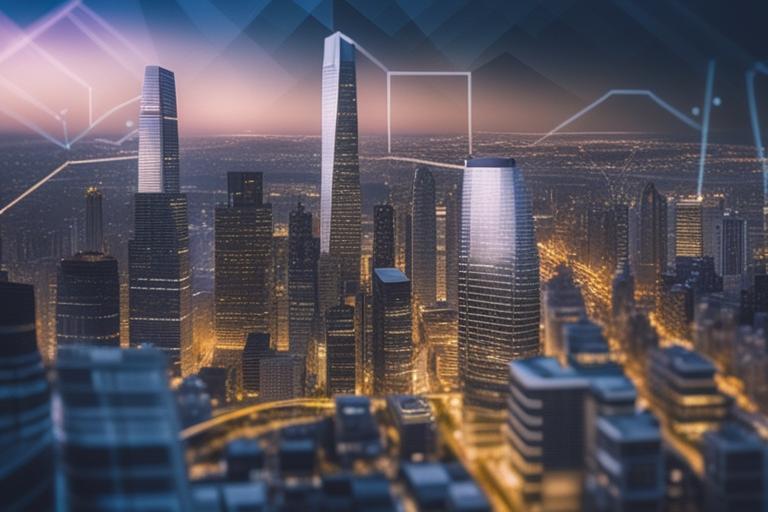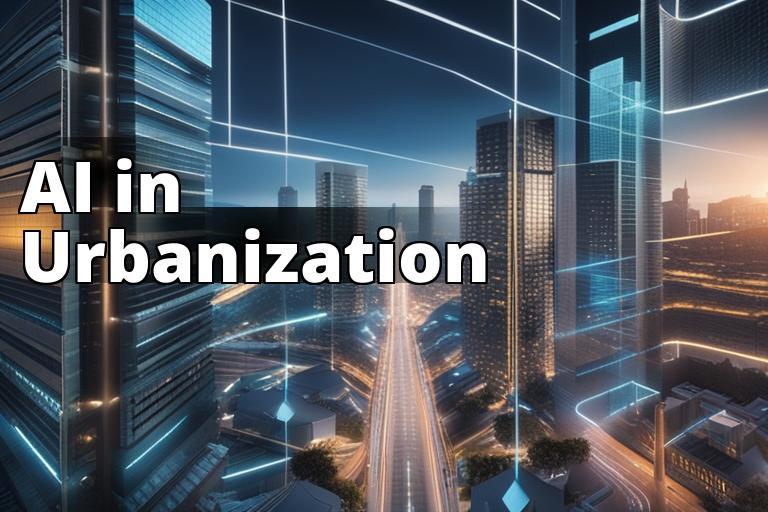The role of AI software in smart cities and urban development is pivotal, driving innovation and efficiency in urban environments. As an AI technology, it simulates intelligent human behavior, enabling cities to address urban challenges and optimize operations. This article delves into the diverse applications of AI software in smart cities and urban development, showcasing its transformative impact.
Contents hideRole of AI Software in Smart Cities and Urban Development
Readers will learn:
– How AI software optimizes traffic flow and enhances public transportation systems in smart cities.
– The role of AI in monitoring and optimizing energy consumption for smart energy management.
– The use of AI in analyzing urban data for informed city planning and identifying optimal locations for infrastructure projects.
Defining AI Software and its Role in Smart Cities
AI software encompasses technologies designed to simulate intelligent human behavior, including learning, problem-solving, and decision-making. In the context of smart cities, AI software serves as a catalyst for innovation, enabling the deployment of intelligent systems to address urban challenges and optimize municipal operations.

AI-Powered Transportation Systems
The implementation of AI software in transportation systems is revolutionizing the movement of people and goods within urban environments.
Optimizing Traffic Flow and Reducing Congestion with AI
AI algorithms analyze real-time traffic data to optimize signal timings, reroute vehicles, and predict traffic patterns, reducing congestion and minimizing environmental impact.
Enhancing Public Transportation Systems Through AI Implementation
AI-driven solutions improve the efficiency of public transit by predicting demand, optimizing routes, and scheduling maintenance, resulting in better service reliability and reduced wait times.

Smart Energy Management
AI software plays a crucial role in managing energy resources and promoting sustainability within urban landscapes.
Monitoring and Optimizing Energy Consumption Using AI
AI-powered systems monitor energy usage in real-time, identify consumption patterns, and automatically adjust energy distribution to minimize waste, reducing costs and contributing to environmental conservation efforts.
Integration of AI for Smart Grid Management and Renewable Energy Solutions in Urban Areas
AI facilitates the integration of renewable energy sources into urban grids by forecasting energy production, optimizing distribution, and enhancing grid resilience, paving the way for a sustainable and reliable energy infrastructure in smart cities.
| Application of AI in Smart Energy Management | Description |
|---|---|
| Monitoring and optimizing energy consumption | AI-powered systems monitor energy usage in real-time, identify consumption patterns, and automatically adjust energy distribution to minimize waste, reducing costs and contributing to environmental conservation efforts. |
| Integration of AI for smart grid management | AI facilitates the integration of renewable energy sources into urban grids by forecasting energy production, optimizing distribution, and enhancing grid resilience, paving the way for a sustainable and reliable energy infrastructure in smart cities. |

Urban Planning and Infrastructure
AI software enables urban planners to make data-driven decisions for the development and expansion of city infrastructure.
Analyzing Urban Data for Informed City Planning with AI
AI algorithms provide valuable insights into population trends, land use patterns, and infrastructure requirements, enabling city planners to make informed decisions that align with the evolving needs of urban communities.
Identifying Optimal Locations for Infrastructure Projects and Urban Services Through AI Solutions
AI-powered predictive modeling aids in identifying suitable locations for new infrastructure projects, public amenities, and essential services, ensuring efficient resource allocation and equitable access for all citizens.

AI for Public Safety and Security
AI technologies significantly enhance public safety and security measures within urban environments.
Enhancing Public Safety Through AI-Driven Predictive Policing and Emergency Response Systems
AI algorithms analyze historical crime data to predict potential hotspots, enabling effective resource allocation and proactive prevention of criminal activities. Additionally, AI optimizes emergency response times through real-time incident analysis and resource dispatch.
AI-Enabled Surveillance and Monitoring for Crime Prevention and Disaster Management in Urban Settings
AI-powered surveillance systems equipped with facial recognition, anomaly detection, and predictive analytics enhance situational awareness, aiding in crime prevention and disaster mitigation efforts, thereby bolstering overall security and resilience in urban areas.

Citizen Services and Governance
The integration of AI software enhances citizen services and governance processes, fostering a more responsive and inclusive urban governance framework.
Improving Citizen Services Through AI-Driven Solutions in Smart Cities
AI applications streamline public service delivery by optimizing resource allocation, automating administrative tasks, and personalizing citizen interactions, leading to improved service efficiency and citizen satisfaction.
Enhancing Governance Processes and Citizen Engagement Through AI Integration
AI tools enable governments to analyze citizen feedback, sentiment, and demographic data to formulate policies that align with the needs and aspirations of urban communities, promoting participatory governance and inclusive decision-making.
Ethical and Privacy Considerations
While AI brings transformative benefits, it also raises critical ethical and privacy concerns that need to be addressed.
Addressing Ethical Implications of AI in Smart City Development
The ethical use of AI in smart city initiatives necessitates considerations of fairness, accountability, and transparency in algorithmic decision-making processes, ensuring that AI technologies do not perpetuate biases or discriminate against any segment of the urban population.
Importance of Responsible AI Deployment and Regulatory Safeguards for Privacy Protection
Regulatory frameworks and ethical guidelines play a pivotal role in safeguarding citizen privacy and ensuring responsible AI deployment, essential for upholding privacy rights in the context of AI-driven urban development.
Case Studies and Real-World Examples
Real-life case studies showcase the successful implementation of AI software in urban development projects, highlighting tangible outcomes and benefits.
Successful Implementation of AI Software in Urban Development Projects
Cities worldwide have leveraged AI to address specific urban challenges, such as traffic management, energy optimization, and public safety, resulting in tangible improvements in quality of life for residents.
Outcomes and Benefits of AI Integration in Smart City Initiatives: Real-Life Cases
Concrete examples of AI integration in smart cities demonstrate improved operational efficiency, resource conservation, and citizen empowerment, reinforcing the value of AI-driven urban development initiatives.
Real-Life Impact of AI Integration in Urban Development
Sarah’s Commute Transformed by AI-Powered Traffic Management
Sarah, a resident of a bustling urban area, used to spend hours stuck in traffic during her daily commute to work. However, the implementation of AI-powered traffic management systems drastically changed her experience. With real-time traffic analysis and adaptive signal control, her commute time was reduced by 30%, leading to less stress and more time for family and personal activities.
This real-life example illustrates the tangible benefits of AI integration in urban development, emphasizing the transformative impact on individual lives within smart cities.
Future Prospects and Challenges
The future of AI in smart cities holds immense promise but presents complex challenges that require careful consideration and strategic planning.
Advancements in AI Technology for Smart Cities and Urban Development
Ongoing advancements in AI, including machine learning, predictive analytics, and autonomous systems, are poised to redefine urban development paradigms, paving the way for more sustainable, resilient, and intelligent cities.
Addressing Urban Sustainability, Resilience, and Equitable Development Using AI
Challenges such as data privacy, algorithmic biases, and equitable access to AI-driven services call for collaborative efforts among stakeholders to ensure that AI fosters sustainable and inclusive urban development.
Conclusion
AI software stands as a transformative force in the evolution of smart cities and urban development, presenting opportunities for collaborative efforts to usher in sustainable and inclusive urban growth through AI integration.
AI software has transformed smart cities, offering the potential for more efficient, resilient, and citizen-centric urban environments.
FAQs
Who develops AI software for smart cities?
AI software for smart cities is developed by tech companies and urban development professionals.
What benefits does AI software bring to urban development?
AI software in smart cities can optimize traffic flow, manage energy usage, and enhance public safety.
How does AI software improve urban infrastructure?
AI software can analyze data to improve waste management, enhance transportation systems, and optimize utility usage.
What are the potential drawbacks of AI in smart cities?
Objection Handler: While AI in smart cities offers efficiency, it raises concerns about privacy and data security.
How is AI software integrated into existing urban systems?
AI software is integrated into smart cities through sensors, IoT devices, and data analytics platforms.
Who oversees the implementation of AI in smart city projects?
Urban planners, local government authorities, and technology experts oversee the implementation of AI in smart city projects.
Dr. Emily Johnson is an expert in urban planning and sustainable development, with a focus on the integration of technology in urban environments. She holds a Ph.D. in Urban Studies and has conducted extensive research on the impact of artificial intelligence on smart city initiatives. Dr. Johnson has published numerous articles in peer-reviewed journals, exploring the role of AI in optimizing traffic flow, energy management, and public safety in urban settings. She has also collaborated with various city governments and technology firms to implement AI-driven solutions for urban development projects.
Dr. Johnson’s work is informed by a deep understanding of the ethical and privacy considerations associated with AI deployment in smart cities, and she has been an advocate for responsible AI integration and regulatory safeguards. Her expertise in this field has been recognized through her involvement in advisory boards for urban development and technology organizations.

Leave a Reply